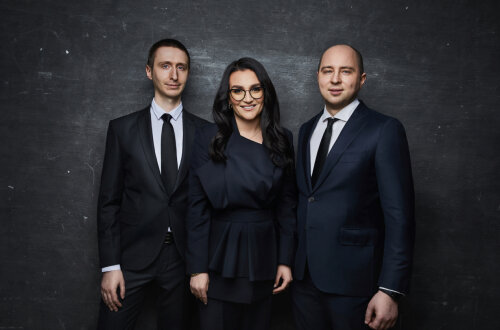Best Child Visitation Lawyers in Klaipėda
Share your needs with us, get contacted by law firms.
Free. Takes 2 min.
Free Guide to Hiring a Family Lawyer
List of the best lawyers in Klaipėda, Republic of Lithuania
About Child Visitation Law in Klaipėda, Republic of Lithuania
Child visitation, also known as contact rights, refers to the legal framework that ensures a child can maintain personal relations and direct contact with both parents following a separation or divorce. In Klaipėda, Republic of Lithuania, these laws are designed with the child’s best interests at heart. Local courts ensure that a child has the opportunity to build and maintain a relationship with the non-custodial parent, barring any circumstances where such contact would be harmful to the child's well-being. Child visitation matters can arise as part of divorce proceedings, following parental separation, or as stand-alone issues when parents disagree about contact with their children.
Why You May Need a Lawyer
Legal assistance is highly recommended in child visitation matters due to the sensitive nature of these cases and the importance of a fair outcome for all involved, especially the child. Common situations requiring legal help include:
- Disagreements between parents about visitation schedules or conditions
- Modifying an existing visitation agreement due to changes in circumstances
- Ensuring your rights are protected if the other parent is denying or restricting visitation without cause
- Addressing concerns about the child’s safety while in the care of the other parent
- Enforcing a court-ordered visitation arrangement
- Cases involving international travel or parents living in different countries
Legal professionals can assist with paperwork, negotiations, and court representation, ensuring that agreements are reached in the best interest of the child.
Local Laws Overview
Child visitation in Klaipėda falls under the Civil Code of the Republic of Lithuania and is further shaped by family law practices in the region. Here are the core aspects relevant to child visitation:
- Both parents have the right and obligation to maintain relations with their child after separation or divorce.
- The specific visitation schedule is usually determined by a mutual agreement between parents or, when necessary, by the court.
- Court decisions prioritize the child’s best interests, including their need for emotional stability and ongoing relationships with both parents, unless there are overriding safety concerns.
- If parents cannot come to an agreement, mediation services are often encouraged before court intervention.
- Parents must comply with court-ordered visitation schedules; repeated violations can result in legal penalties or modification of existing orders.
- Facilitation of visitation in cases involving allegations of abuse or neglect may involve supervised contact or specific restrictions.
- Decisions may be reviewed and modified if significant changes in circumstances occur, such as relocation or changes in the child’s needs.
Frequently Asked Questions
What is child visitation?
Child visitation refers to the right of the non-custodial parent or other relatives to maintain regular contact with a child after the parents separate or divorce.
How are visitation schedules determined in Klaipėda?
Visitation schedules can be agreed upon by the parents. If parents cannot reach an agreement, the court may decide on a schedule that serves the best interests of the child.
Can grandparents or other relatives seek visitation rights?
Yes, under certain circumstances, relatives such as grandparents may apply for visitation rights if it is in the child’s best interest to maintain those relationships.
Is child visitation automatically granted to both parents?
Visitation is presumed to be in the child's best interest, except in cases where contact may endanger the child's well-being.
What happens if one parent refuses to comply with a visitation order?
A parent who repeatedly ignores or violates a visitation order may face legal consequences, including fines or changes to custody arrangements.
What if the child does not want to visit the other parent?
The child's views will be considered, especially as they get older, but the final decision is always based on the child's best interests as determined by the court.
Can visitation arrangements be changed later?
Yes, modifications can be made if there is a significant change in circumstances or if the child’s needs change.
What role do mediators play in visitation disputes?
Mediators help parents reach an agreement on visitation without needing a court decision. Mediation is encouraged as it can foster cooperation and reduce conflict.
Are supervised visitations possible?
Supervised visitation may be ordered when there are concerns about the child’s safety or well-being during visits with the non-custodial parent.
How do I start legal proceedings to establish or modify visitation?
You will need to apply to the local court. It is strongly recommended to consult with a family law lawyer for help with preparing your case and representing your interests.
Additional Resources
For further support or information regarding child visitation in Klaipėda, you may consider contacting the following:
- Klaipėda City Municipality Child Rights Protection Division - Provides guidance and assistance concerning child welfare issues, including visitation.
- State Guaranteed Legal Aid Service - Offers legal aid and advice for individuals who meet specific eligibility criteria.
- Child Rights Ombudsman’s Office of the Republic of Lithuania - Monitors and promotes the protection of children’s rights on a national level.
- Family mediation centers - Help parents resolve visitation and other family disputes through mediation.
Next Steps
If you are dealing with a child visitation issue in Klaipėda, consider the following steps:
- Document your situation and attempts to reach an agreement with the other parent.
- Contact a qualified family law lawyer for a consultation to understand your rights and obligations.
- If applicable, utilize mediation services to try to reach an amicable solution before involving the court.
- If an agreement cannot be reached, file the necessary paperwork with your local court to have the matter decided legally.
- Follow all court orders and continue to place the child’s best interests at the center of all decisions.
Professional legal support can help ensure that your child visitation arrangements are fair, enforceable, and in your child’s best interests.
Lawzana helps you find the best lawyers and law firms in Klaipėda through a curated and pre-screened list of qualified legal professionals. Our platform offers rankings and detailed profiles of attorneys and law firms, allowing you to compare based on practice areas, including Child Visitation, experience, and client feedback.
Each profile includes a description of the firm's areas of practice, client reviews, team members and partners, year of establishment, spoken languages, office locations, contact information, social media presence, and any published articles or resources. Most firms on our platform speak English and are experienced in both local and international legal matters.
Get a quote from top-rated law firms in Klaipėda, Republic of Lithuania — quickly, securely, and without unnecessary hassle.
Disclaimer:
The information provided on this page is for general informational purposes only and does not constitute legal advice. While we strive to ensure the accuracy and relevance of the content, legal information may change over time, and interpretations of the law can vary. You should always consult with a qualified legal professional for advice specific to your situation.
We disclaim all liability for actions taken or not taken based on the content of this page. If you believe any information is incorrect or outdated, please contact us, and we will review and update it where appropriate.














